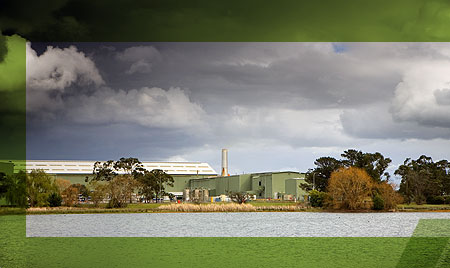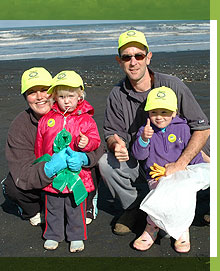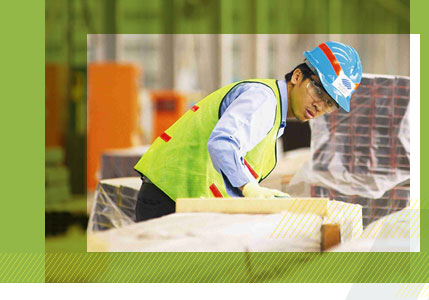Material Efficiency
Case Studies
 |
|
Western Port Reduces Waste to Landfill
The Western Port site is committed to ensuring a sustainable future by continually looking at ways to reduce all waste streams, large and small, leading to incremental change, or where possible, a step change in performance.
The site has made a remarkable reduction in the volume of Prescribed Industrial Waste (PIW) going to landfill, more than halving the amount produced over the past seven years.
This significant achievement resulted in a PIW reduction of 2.6 kilos per tonne of steel produced from 1999 to 2006. This equates to 65 per cent less waste going to landfill.
Several key factors and new practices contributed to the waste reduction. Significant benefits were gained by changing the management of filter cake (a residue produced in the treatment of water used in the steel manufacturing process) through the installation of a filter cake drying plant and developing a stronger partnership with the waste service provider. Implementing glove and rag recycling programs, establishing a site environmental committee and applying the ISO 14001 environmental management system were also fundamental in reducing the volume.
BlueScope Steel Western Port President Greg Waters said our long term environmental achievements at Western Port were something of which to be proud, with the site holding an accredited EPA licence since 1996.
“We are pleased to be entering our third five-year Environment Improvement Plan (EIP) with the EPA,” he said.
“Our reduction in PIW to landfill is just one example of where our rigorous pursuit of improvements has delivered savings to our business, the environment and the broader community.”
Record Numbers Turn Out for Beach Clean-Up
 |
Record crowd cleans up New Zealand's Franklin beach with volunteers aged 3 to 70 years old. |
A record number of people turned out to help clean up Franklin’s busiest beach, Karioitahi, in September.
The fourth annual New Zealand Steel Beach Clean-Up attracted 320 people, up from 200 last year, from New Zealand Steel and throughout the region. Volunteers ranged in age from three to over 70.
Ten tonnes of rubbish was collected on the day compared to 30 tonnes last year, possible proof that the message about the responsible disposing of rubbish is getting through.
New Zealand Steel organisers were delighted with the record turnout and the wonderful support from sponsoring business and community groups.
Recycle or Reuse for BlueScope Steel Indonesia
 |
BlueScope Steel's Indonesian sites are leaders in waste management. Effective waste management practices ensure high material efficiency and minimal waste disposal to landfill. |
BlueScope Steel’s Indonesian sites are leaders in waste management in Asia, with more than 90 per cent of general waste produced at our Indonesian operations being recycled or reused. In line with legal compliance obligations and BlueScope Steel best practice, our Indonesian operations have implemented effective waste management practices to ensure high material efficiency and minimal waste disposal to landfill during 2005/06.
Recycling and Reusing
Waste segregation techniques are employed at BlueScope Lysaght sites in Indonesia. The current reuse program for steel strapping ensures disposal to landfill is minimised. BlueScope Steel Indonesia also has a program operating to ensure dross, a waste product caused by smelting, is reused offsite.
Metal Coating Line - Reducing of Alkaline Waste in the Degreasing Process
To address the amount of Total Dissolved Solid (TDS) produced, a system controlling and monitoring the amount of alkaline waste at the metal coating line was implemented in March 2006.
The new system reduced the amount of premix alkaline by 35 per cent per month and decreased water use by 20 per cent per month. The TDS results for September 2006 showed amounts significantly below legal compliance requirements.
Coil Painting Line - Reducing Paint Waste
Improved use of paint and better relationships with the paint vendor has reduced the amount of paint waste requiring treatment.
Reducing Sludge from the Waste Water Treatment Plant
Since March 2006, hazardous off-spec sludge waste has been reduced to zero as a result of a new technique to compress it. The method adds hydrated lime to the sludge to make it more solid allowing for compression and reduction of the waste.
